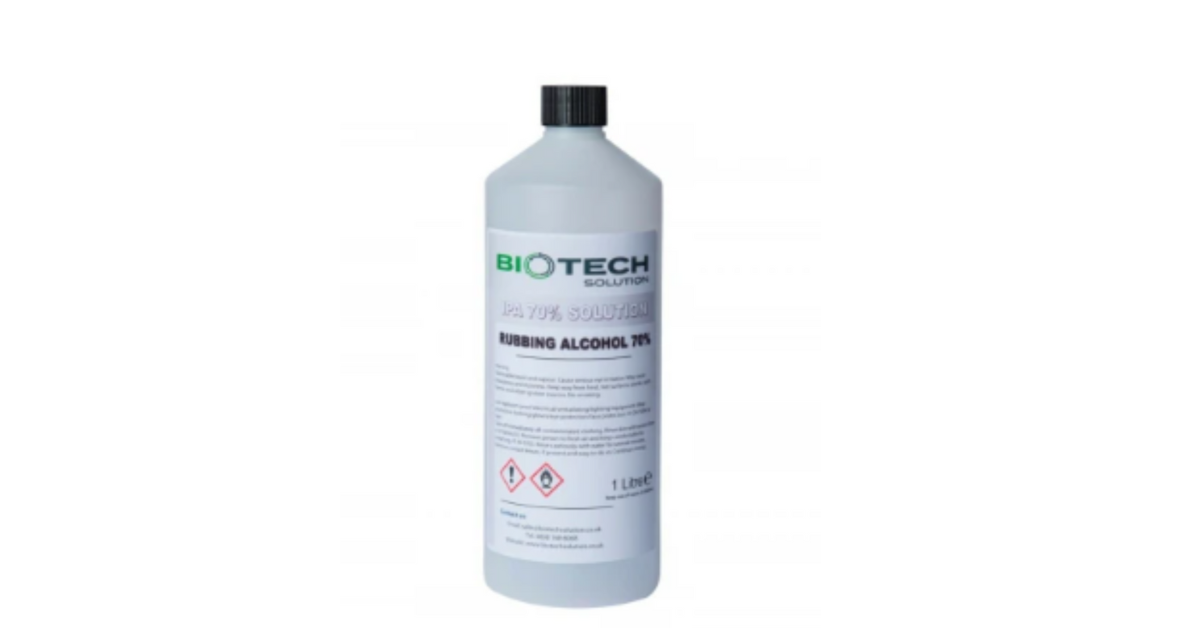In the UK, rubbing alcohol is often found in medicine cabinets, but its uses go far beyond first aid. Also known as isopropyl alcohol, this clear liquid has become a multi-purpose essential. Whether for disinfecting, cleaning, or even personal care, rubbing alcohol is incredibly useful.
It’s affordable, easy to find, and offers quick results. But how much do you really know about this household staple? In this guide, we’ll uncover its top uses, smart tips, and important safety facts you need to know.
What Is Rubbing Alcohol?
Rubbing alcohol is a solution that contains isopropyl alcohol, usually in concentrations of 70% or 90%. It evaporates quickly and kills bacteria, viruses, and fungi on contact. In the UK, it’s available at pharmacies, supermarkets, and online.
Many people confuse rubbing alcohol with surgical spirit. While they are similar, rubbing alcohol is typically purer and often used in more sensitive applications.
Top 7 Uses of Rubbing Alcohol in Everyday Life
1. Disinfecting Surfaces Quickly
Rubbing alcohol is one of the most effective disinfectants for hard surfaces. It kills most germs within seconds.
-
Use it to wipe down door handles, light switches, and remote controls.
-
Spray it on kitchen counters or bathroom tiles.
-
It’s perfect for cleaning phones and keyboards.
A 2023 NHS report confirmed that rubbing alcohol at 70% concentration can kill over 99.9% of common bacteria and viruses.
2. First Aid and Wound Cleaning
One of the oldest uses of rubbing alcohol is treating minor cuts and scrapes.
-
Clean small wounds before applying a bandage.
-
Use it to sterilise tweezers or scissors.
Doctors recommend using 70% alcohol as it penetrates cell walls better than higher concentrations.
“70% isopropyl alcohol is ideal for home first aid use,” says Dr. Emily Carter, NHS General Practitioner.
3. Removing Sticky Residue
Struggling with sticky labels or glue? Rubbing alcohol works fast.
-
Apply with a cotton ball and rub gently.
-
It breaks down adhesives without damaging surfaces.
-
Works on glass, plastic, and even clothing.
This simple trick saves time and effort, especially for parents dealing with sticker messes.
4. Cleaning Mirrors and Glass
Forget streaky windows. Rubbing alcohol leaves a crystal-clear finish.
-
Mix equal parts rubbing alcohol and water.
-
Spray on mirrors and wipe with a microfibre cloth.
Unlike vinegar or soap, it doesn’t leave smudges. It also dries much faster.
5. Fighting Body Odour and Acne
Due to its antibacterial properties, rubbing alcohol can be helpful for personal care.
-
Dab a small amount on sweaty areas to kill odour-causing bacteria.
-
Use it as a spot treatment for acne (but avoid sensitive skin).
According to the British Skin Foundation, alcohol-based solutions can reduce acne-causing bacteria by up to 65% when used moderately.
6. Eliminating Bed Bugs and Lice
Many UK homeowners have used rubbing alcohol to deal with pests.
-
Spray directly on mattresses or furniture where bugs may hide.
-
Alcohol destroys insect eggs and dries out live pests.
However, always combine with deep cleaning for best results.
7. Deodorising and Cleaning Shoes
Smelly trainers? Spray them with rubbing alcohol.
-
Kills bacteria causing odours.
-
Helps dry damp shoes faster.
-
Works well for gym bags too.
Let the shoes air dry fully before wearing again.
Safety Tips for Using Rubbing Alcohol
-
Always keep rubbing alcohol away from open flames.
-
Avoid using on large wounds or deep cuts.
-
Never mix it with bleach or other strong chemicals.
-
Store it in a cool, dry place, away from children.
Why 70% Rubbing Alcohol Is More Effective Than 90%
It sounds strange, but 70% rubbing alcohol is often more powerful than 90%. Here’s why:
-
The added water slows evaporation.
-
It allows alcohol more time to kill bacteria.
-
90% evaporates too quickly to penetrate cell membranes.
For everyday disinfecting, choose 70%. For electronics, 90% is better as it dries faster and leaves no residue.
Where to Buy Rubbing Alcohol in the UK
You can find rubbing alcohol in:
-
Boots and Superdrug
-
Amazon UK
-
Tesco and Asda pharmacies
-
Local chemists
Prices range between £1.50 and £5 depending on size and concentration. Choose 70% for general use.
Rubbing Alcohol vs Other Disinfectants
| Cleaner | Pros | Cons |
|---|---|---|
| Rubbing Alcohol | Quick-drying, kills 99.9% germs | Flammable, strong smell |
| Bleach | Powerful for large areas | Harsh, not safe for skin |
| Vinegar | Natural, cheap | Not effective against viruses |
| Hydrogen Peroxide | Safe for wounds | Slower to act |
Rubbing alcohol stands out for its speed, versatility, and low cost.
Interesting Facts About Rubbing Alcohol
-
Invented in 1920, it’s now a global essential.
-
Over 60% of UK households keep it in their home.
-
70% isopropyl alcohol kills most bacteria within 30 seconds.
-
It’s one of the only disinfectants safe for electronics when used properly.
Frequently Asked Questions
Is rubbing alcohol safe for skin?
Yes, in small amounts. Avoid using it daily or on broken skin.
Can you drink rubbing alcohol?
No. It’s toxic and can cause serious harm or death.
What’s the difference between surgical spirit and rubbing alcohol?
Surgical spirit may contain additives like menthol or oil. Rubbing alcohol is usually purer and used for cleaning and first aid.
Can it clean phones and electronics?
Yes, but use 90% alcohol and apply it to a cloth, not directly on the device.
Final Thoughts
Rubbing alcohol is an affordable, reliable, and powerful cleaner. From first aid to pest control, it has dozens of practical uses. Every UK household should keep a bottle on hand.
Whether you’re cleaning a screen, fighting germs, or freshening up your shoes, rubbing alcohol is the answer. With proper use, it can replace several expensive products and save both time and money.
